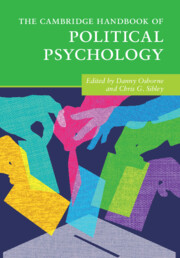Book contents
- The Cambridge Handbook of Political Psychology
- The Cambridge Handbook of Political Psychology
- Copyright page
- Dedication
- Contents
- Figures
- Tables
- Contributors
- Part I Foundations of Political Psychology
- Part II The Politics of Intergroup Attitudes
- Part III Contemporary Challenges to Democracy
- 23 The Political Psychology of Inequality
- 24 How Social Class Influences Political Choices
- 25 Fear and Loathing in American Politics
- 26 Political Extremism
- 27 The Politics of Hate
- 28 Populism
- 29 A Cultural Theory of Autocracy-vs-Democracy
- 30 Psychological Theories Meet the Challenge of Persuading and Mobilising Voters
- 31 Collective Action for Social Change
- 32 Opinion Formation and Polarisation in the News Feed Era
- 33 Conspiracy Theory Belief and Conspiratorial Thinking
- 34 Political Psychology and the Climate Crisis
- 35 The Political Psychology of Cyberterrorism
- 36 Reconciliation in the Aftermath of Collective Violence
- Part IV Diversifying Perspectives in Political Psychology
- Index
- References
23 - The Political Psychology of Inequality
Why Rising Rates of Economic Inequality Affect Our Health and Democracy
from Part III - Contemporary Challenges to Democracy
Published online by Cambridge University Press: 17 February 2022
- The Cambridge Handbook of Political Psychology
- The Cambridge Handbook of Political Psychology
- Copyright page
- Dedication
- Contents
- Figures
- Tables
- Contributors
- Part I Foundations of Political Psychology
- Part II The Politics of Intergroup Attitudes
- Part III Contemporary Challenges to Democracy
- 23 The Political Psychology of Inequality
- 24 How Social Class Influences Political Choices
- 25 Fear and Loathing in American Politics
- 26 Political Extremism
- 27 The Politics of Hate
- 28 Populism
- 29 A Cultural Theory of Autocracy-vs-Democracy
- 30 Psychological Theories Meet the Challenge of Persuading and Mobilising Voters
- 31 Collective Action for Social Change
- 32 Opinion Formation and Polarisation in the News Feed Era
- 33 Conspiracy Theory Belief and Conspiratorial Thinking
- 34 Political Psychology and the Climate Crisis
- 35 The Political Psychology of Cyberterrorism
- 36 Reconciliation in the Aftermath of Collective Violence
- Part IV Diversifying Perspectives in Political Psychology
- Index
- References
Summary
Rising rates of inequality undermine people’s health and well-being, as well as their civic engagement and trust in democracy. Despite the severity of these effects, little is known about the psychological processes that transmit macro levels of inequality into individual-level outcomes. We argue in the current chapter that these harmful effects emerge because inequality fosters feelings of relative deprivation – even among those who are objectively well-off. We begin by reviewing distinct measures of inequality and people’s corresponding views towards, and (mis)perceptions of, inequality, as well as the ideologies used to justify the rising rates of inequality. We then examine the impact inequality has on both well-being and social cohesion, noting that people’s tendency to make upward social comparisons leaves even the wealthy feeling relatively deprived. We conclude with a discussion on the prospects for change, noting that, although the COVID-19 pandemic has increased awareness of economic-based injustices, the psychological and sociostructural barriers discussed in this chapter constitute major challenges for social change.
- Type
- Chapter
- Information
- The Cambridge Handbook of Political Psychology , pp. 363 - 381Publisher: Cambridge University PressPrint publication year: 2022
References
- 5
- Cited by



